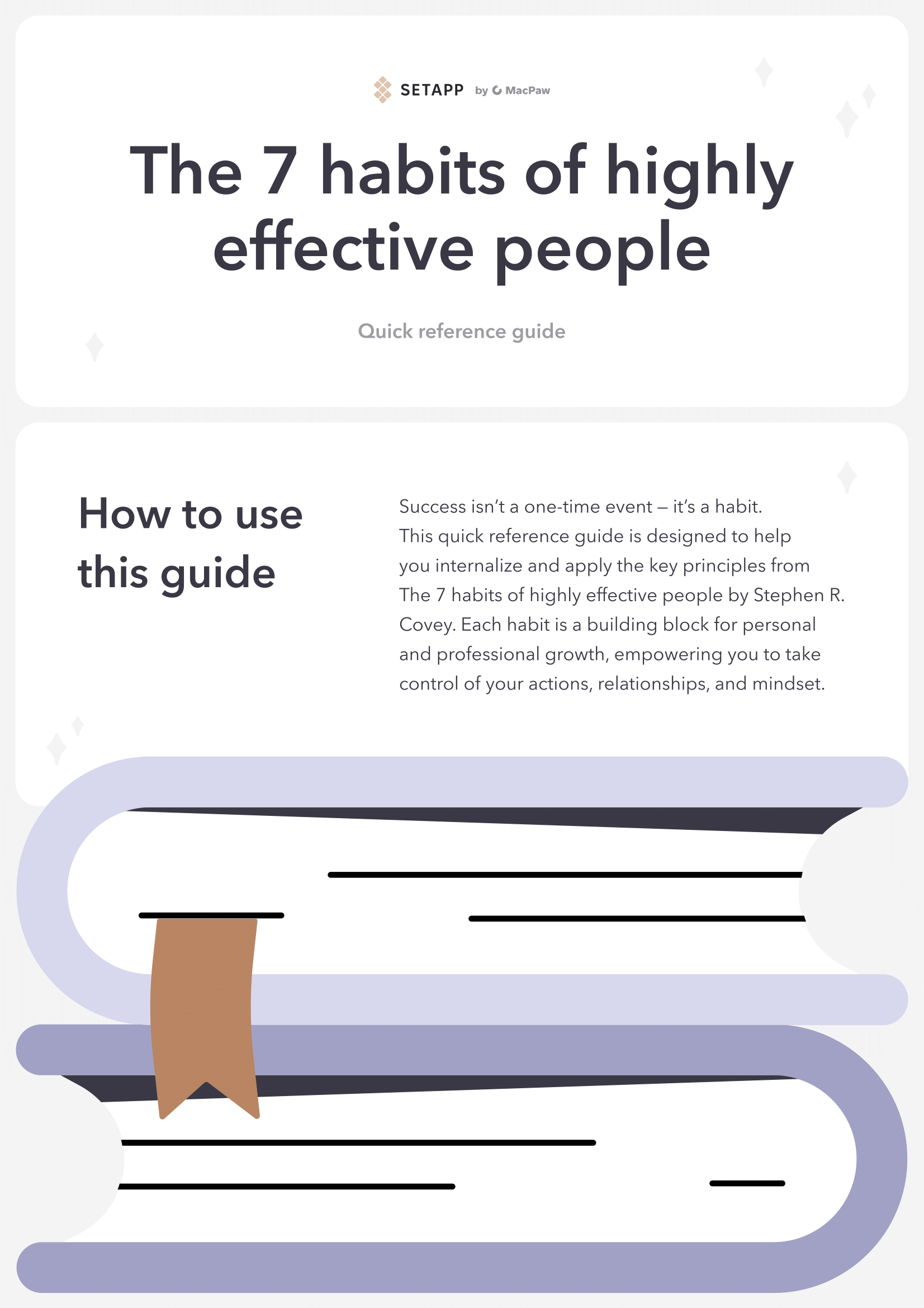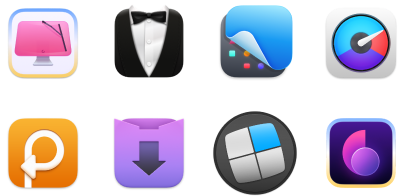The 7 habits of highly effective people by Stephen R. Covey [Book summary + practical tips]
If you’re searching for some motivation and want to finally take control of your life, definitely check out “The 7 habits of highly effective people.” I know, the title might sound a bit basic, but this didn’t stop me. I’d describe the book as insightful, well-structured, and super practical.
What to expect from this article? First, I’ll write “The 7 habits of highly effective people” summary. Then, you’ll get a couple of tips that will help you put Covey’s ideas into action. Even better! I’ll share a few tools I used to make the habits from the book stick better and improve my life in general.
Why it deserves your attention
“Why would a book from 1989 be relevant today?” you may ask. Honestly, when I first saw its publication date, I felt skeptical. Could Covey’s habits from decades ago really apply to our world in 2025? After reading the book to the last page, however, I can say that the habits the author shares are based on timeless principles. And they are more relevant now than ever.
I took away at least two great ideas from “7 habits.” One helped me feel much calmer and concentrated. Another one brought more confidence into my life. What more can I expect from a book? I hope I’ve sparked your interest.
The seven habits at a glance
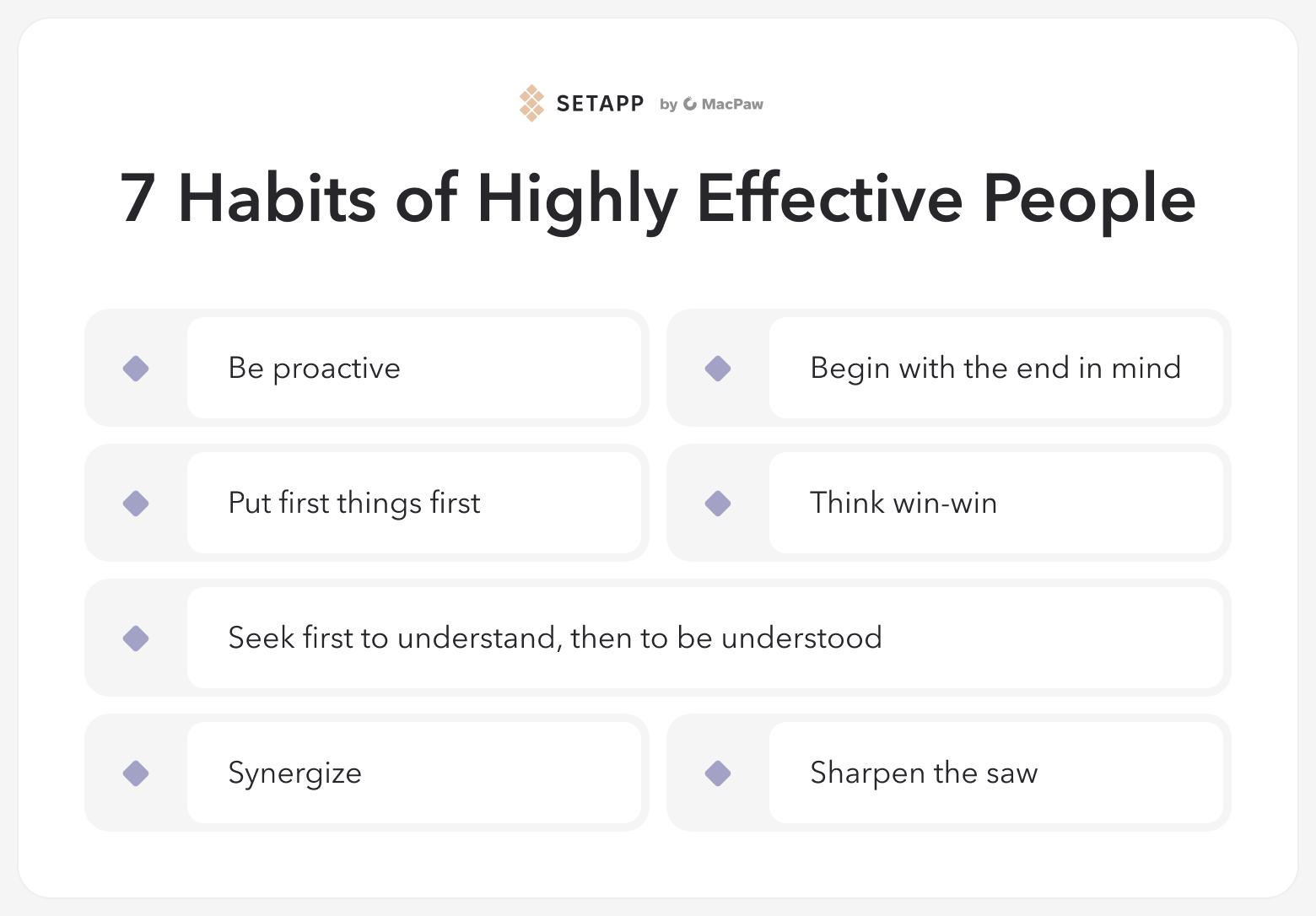
Habit 1: Be proactive
Those who take responsibility for their actions and choices live better, more fulfilled lives.
“I’m not a product of my circumstances. I’m a product of my decisions.”
Covey categorizes individuals as either proactive or reactive.
Proactive people have their own internal climate. It doesn’t matter to them if it’s raining or sunny outside. They are guided by their own values. For example, if they value high-quality work, their performance will remain consistent regardless of external circumstances.
In contrast, reactive people rely on their social environment or the “social weather.” When others treat them well, they feel good. However, when others are unkind, they become withdrawn and defensive. Reactive individuals allow their emotional well-being to be influenced by others, thereby letting their vulnerabilities sway their responses.
How to implement the habit:
Identify one area of your life where you often feel reactive. Write down three specific actions you can take to change your usual behavior. Let’s say you often stress and procrastinate at work. So when you get a task with a tough deadline, your usual behavior might be to procrastinate and blame your boss for being too pushy. If you master this “Be proactive” habit, you take responsibility and do not blame someone else. Instead, you are looking for ways in which you can get your work done. Alternatively, you change your occupation and start doing what you love.
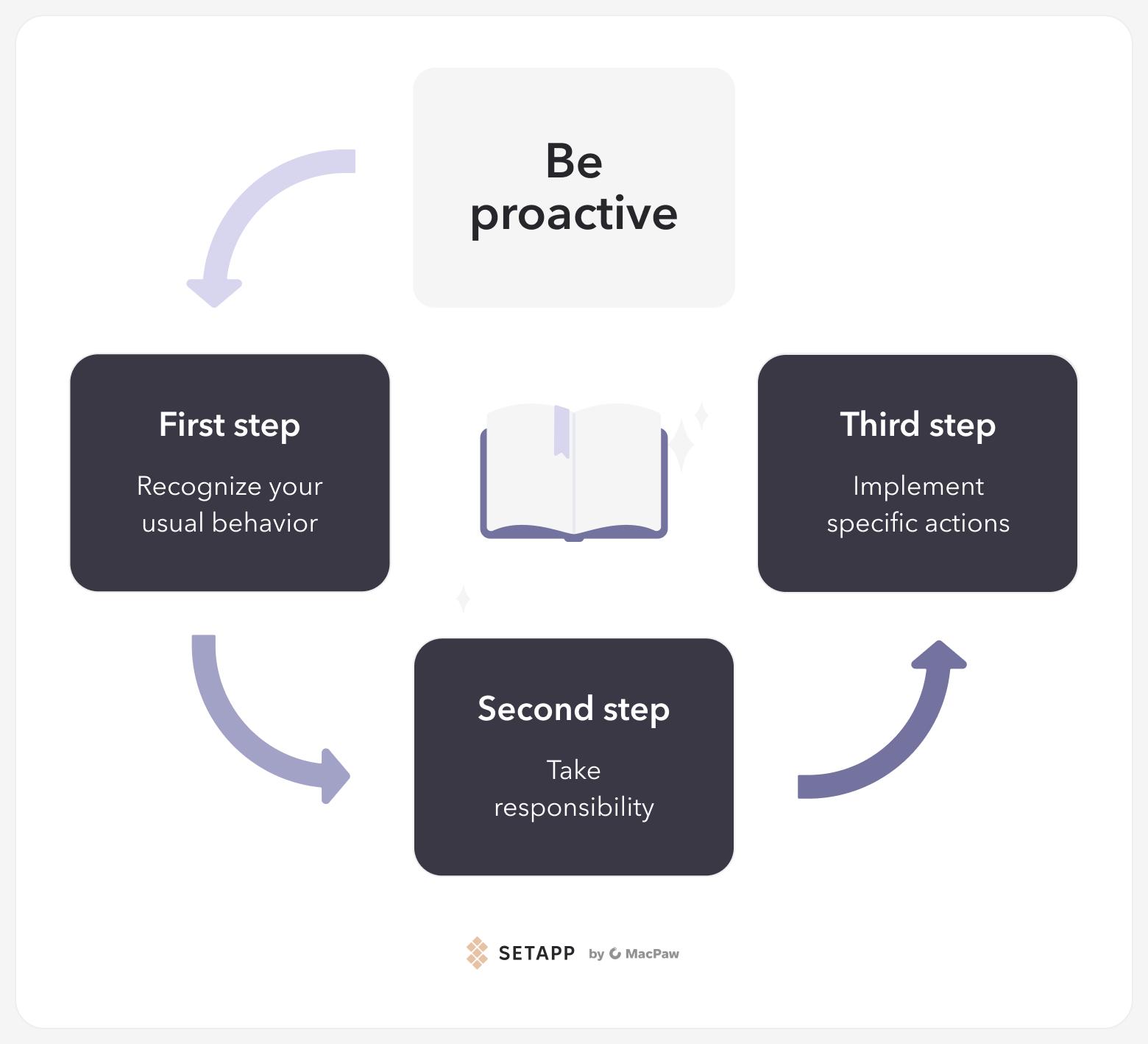
Habit 2: Begin with the end in mind
Visualize your goals and try to define what success looks and feels like for you.
“All things are created twice: first in the mind and then in reality.”
Starting with the end in mind means starting with a clear sense of your purpose in life. Try to understand what you want. Then, see where you are at the moment. What steps can you take to achieve what you want in your life?
How to implement the habit:
Think about where you want to end up. Create a personal mission statement or philosophy that reflects what really matters to you. This mission will act like a guiding light, showing you the person you want to become. For example, you can write traits like honesty, kindness, and strength. Then, think about what positive impact you want to have. It can be in your job, community service, or personal life.
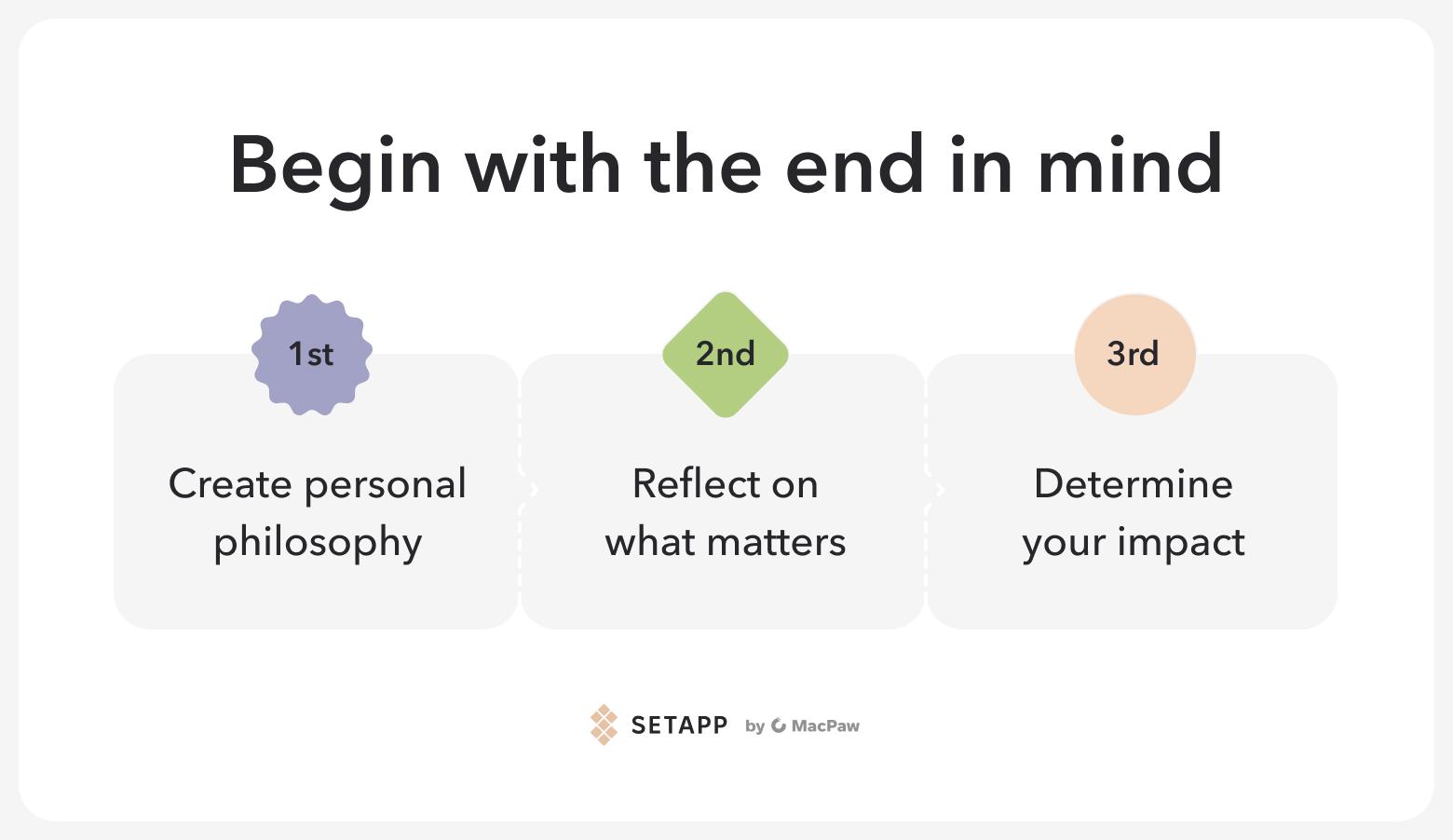
Habit 3: Put first things first
This habit is about prioritizing important tasks over urgent ones.
“The key is not to prioritize what’s on your schedule, but to schedule your priorities.”
Putting first things first means putting habits one and two into action. Be proactive and use your core values to figure out what tasks are most important to you.
How to implement the habit:
Use a planner to map out your week. Identify your top three priorities each day. Schedule dedicated time blocks for these tasks and make sure to turn off distractions during these periods. For example, if writing is your priority, block time in your calendar specifically for that.
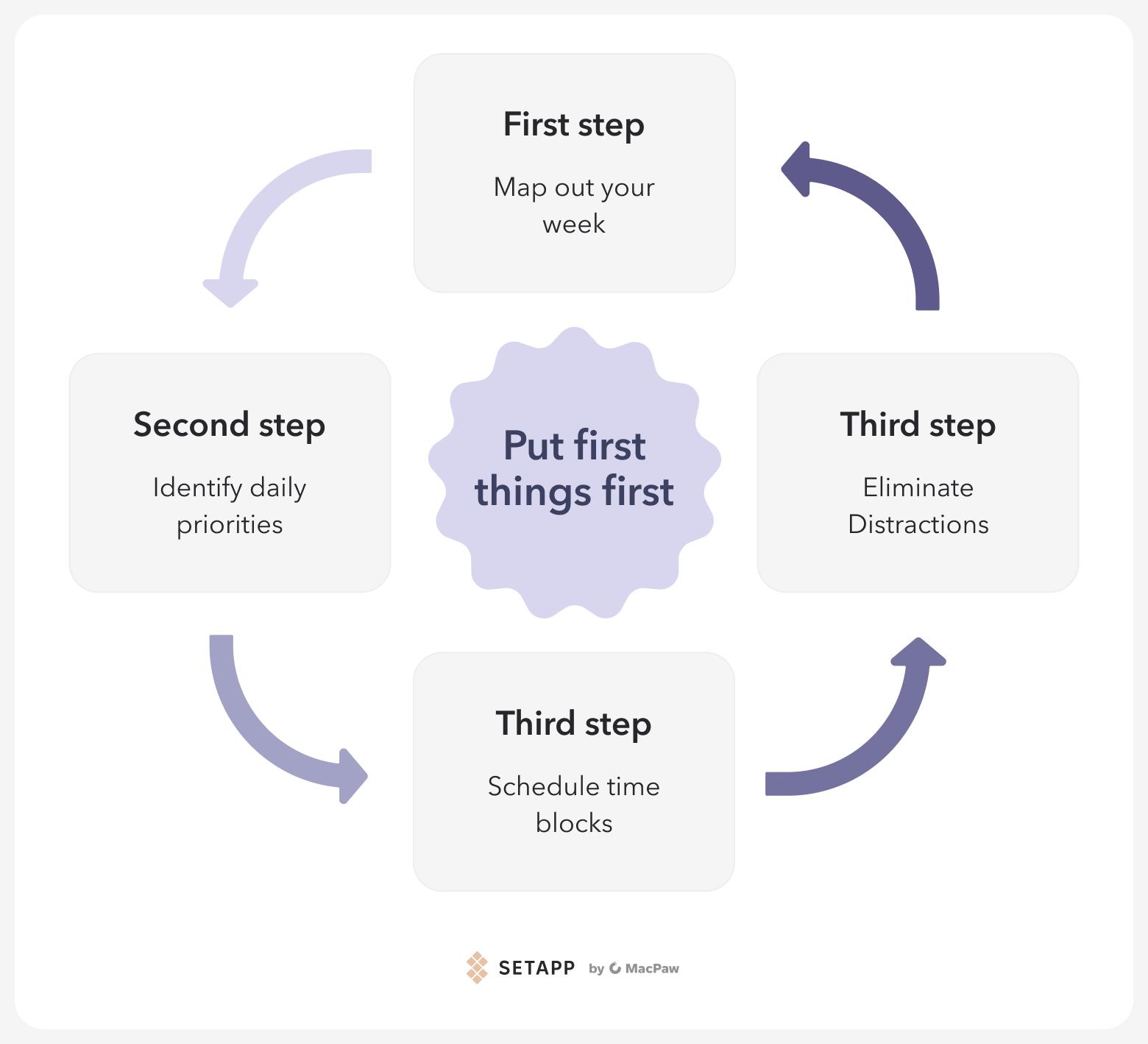
Tip
You may also like “How to set and track professional goals: Personal experience.”
Habit 4: Think win-win
Cooperation or competition? This habit promotes healthy relationships in both personal and professional settings.
“Win-win is not a technique; it’s a mindset.”
Most of life is about working together instead of going it alone. The things you want to achieve usually depend on how well you team up with others.
How to implement the habit:
Next time when you negotiate, try to find a solution that benefits you and your conversation partner. Focus on collaboration, not competition.
Habit 5: Seek first to understand, then to be understood
I bet you heard about the importance of empathetic listening. But have you mastered it?
“Most people do not listen with the intent to understand; they listen with the intent to reply.”
Remember to be open-minded and avoid judgment. It’s not easy, but if you try, you can work together more effectively and build stronger relationships with others.
How to implement the habit:
Practice active listening in your conversations. After the other person has spoken, rephrase what they said. This will help you make sure you understand them. Only then share your thoughts. This builds trust and improves communication.
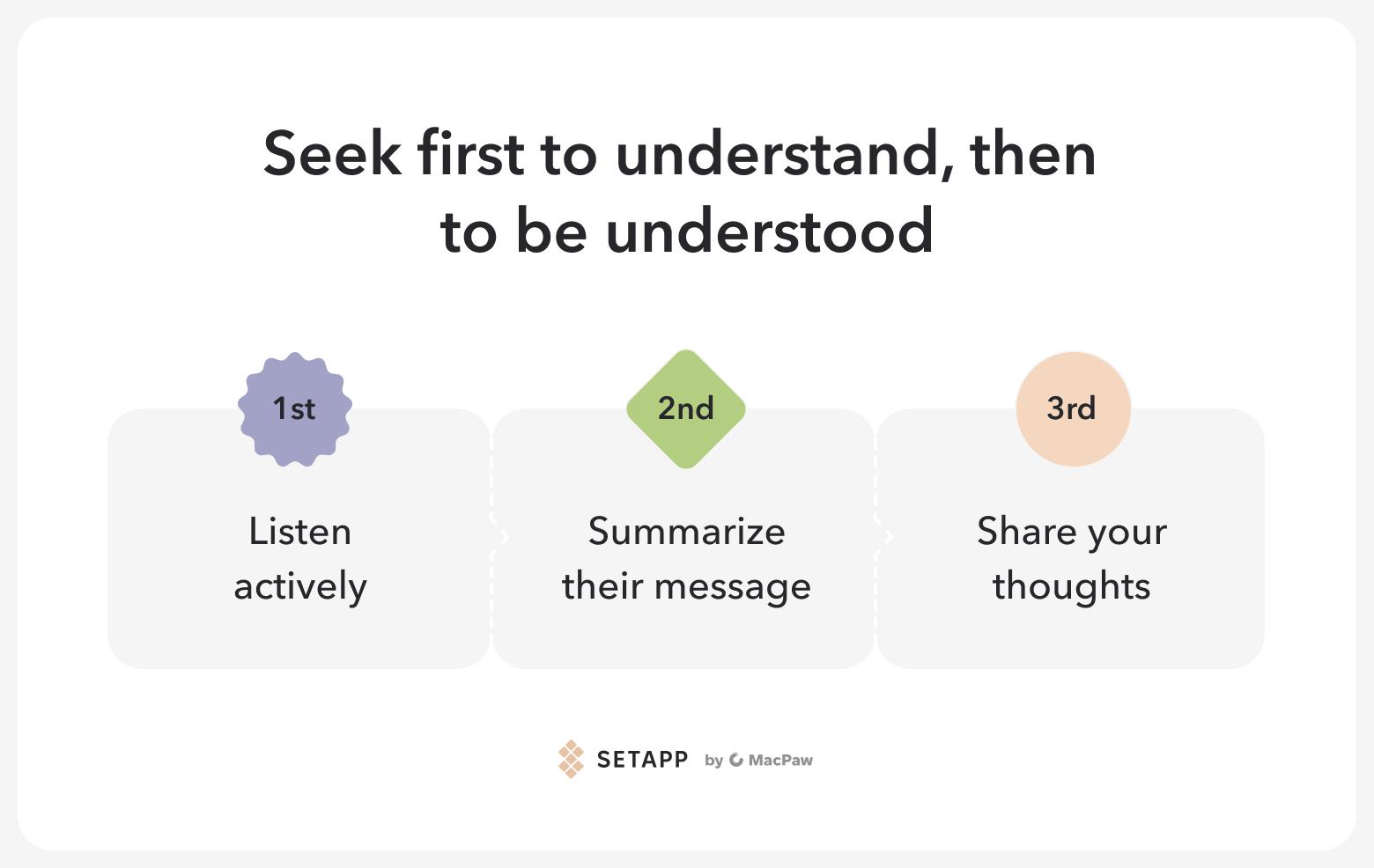
Tip
Active listening is super important, but let’s face it — it’s tough to stay focused for more than 20 minutes in online meetings like Zoom or Google Meet.
Take notes! This will help you remember what’s important. With SideNotes, you can quickly jot down thoughts without interrupting the flow of the video call. You can hide your notes when you don’t need them and bring them back whenever you do. Plus, if someone shares a link or image in the chat, you can easily save it in SideNotes. You can even color-code your notes or turn them into to-do items to keep everything organized.
Habit 6: Synergize
This habit helps us appreciate differences and use them to achieve better results.
“The whole is greater than the sum of its parts.”
A truly effective person understands that their own viewpoint has its limits. They recognize the benefits of connecting with others and appreciate the new ideas that come from those interactions. They value different perspectives because those differences enhance their understanding of reality. When we only rely on our own experiences, we end up missing out on a lot of important information.
How to implement the habit:
Collaborate with someone who has a different perspective than yours on a project. Brainstorm together and encourage each other to share ideas. Embrace the differences and look for solutions that combine the best of both viewpoints.
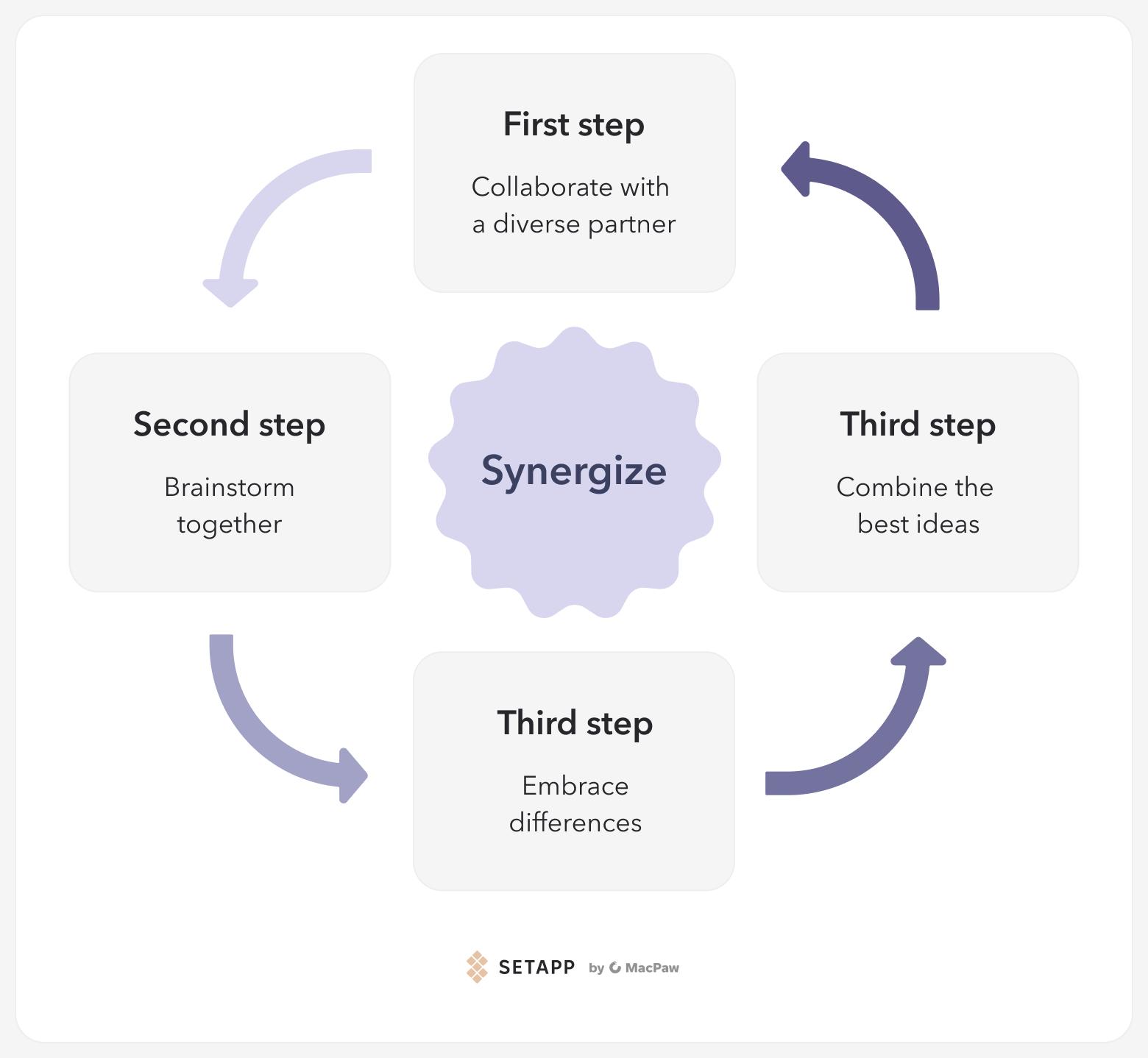
Tip
Habit 7: Sharpen the saw
Habit 7 is all about taking care of your personal resources and what you have at your disposal. It’s about developing and boosting your greatest asset – you!
“You must never cease to sharpen the saw.”
The habit focuses on self-renewal in four areas: physical, social/emotional, mental, and spiritual.
How to implement the habit:
Plan a weekly ritual for self-care. Be sure to include activities related to physical, social/emotional, mental, and spiritual health. For example, exercise for physical health, read a book for mental growth, spend quality time with loved ones for social well-being (your dog counts, too, sniff-sniff), and meditate or reflect for spiritual renewal. Schedule these activities in your calendar to ensure they happen.
Tip
Final thoughts: How I brought the habits to life
After putting the principles from “The 7 habits of highly effective people” to the test, I’d love to share my personal insights.
Habit 1: Be proactive
Before I read the book, I was already trying to be proactive, but I didn’t fully appreciate its importance until then. Reading it helped me understand why I started to earn more money. Because I started taking responsibility for my actions instead of blaming my circumstances. When I focused on what I could control and took action, everything changed.
Habit 2: Begin with the end in mind
This really resonated with me, especially after losing my father to cancer just five months ago. Our conversations made me realize how common it is for people facing such challenges to feel they haven’t accomplished what they truly wanted.
While it can feel morbid to think about the end of life, this habit helps clarify what you really want to achieve. Visualize your goals and act!
Habit 3: Put first things first
This habit is all about planning wisely. I’ve learned a lot about planning from various books, including “Deep work” by Cal Newport. Using the 2Do app has really helped me track my goals and manage my time effectively, making it much easier to stay focused on what matters.
Habit 4: Think win-win
I’ll be honest here: I often struggle to think win-win because of my competitive nature. It’s hard to focus on collaboration when my ego gets involved. However, I see that healthy competition can push us to do better as long as it doesn’t get in the way of teamwork.
Habit 5: Seek first to understand, then to be understood
Many friends say I’m a good listener, but I still struggle with listening during boring online meetings. That’s why I recommend using tools like SideNotes to take notes while listening. It helps me stay engaged and ensure I understand others better.
Habit 6: Synergize
I know networking is important. But this habit is more about being open-minded and valuing others’ perspectives. This has been tougher for me. I couldn’t find a person who thinks very differently and wants to exchange experiences. Maybe I’ll try this later. Fortunately, I’m not limited to my city because online tools like Muse can help us connect and brainstorm effectively.
Habit 7: Sharpen the saw
I like to find time for myself. It helps me recharge and prevents burnout (which I had less than a year ago). When I tried to stick to this habit, I used the Mental Walk app for guided self-reflection. UpLife became handy for meditations.
My final advice is to not just read Covey’s concepts; live them. Try out these habits, adapt where necessary, and see how they can transform your life. All of the tools mentioned in this article are available as part of a single subscription to Setapp.
Download the 7 habits guide in PDF:
